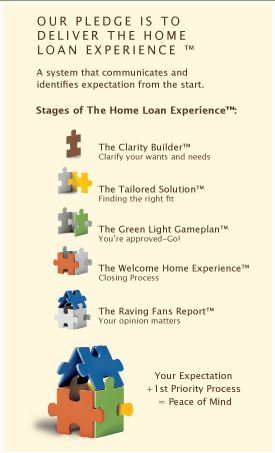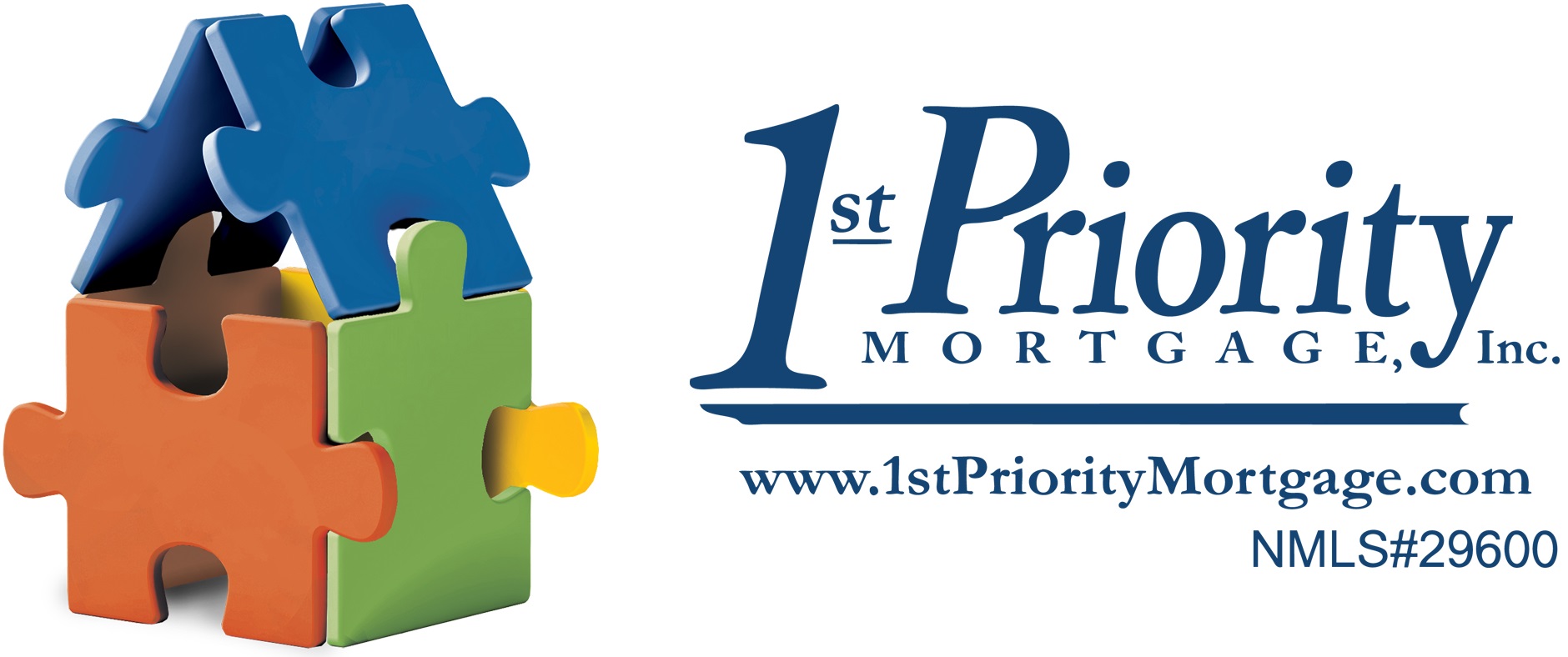-
Q: Why use 1st Priority Mortgage, Inc.?
We Deliver the Home Loan ExperienceTM. 1st Priority Mortgage, Inc. researches your options, providing you with an education regarding the mortgage process, and helps determine the best programs available for your personal needs. We use technology to enhance our service. A process that takes the complex mortgage finance and makes it simple. Your needs and 1st Priority Mortgage’s process equals peace of mind.
-
Q: Is my personal information safe and secure on the 1st Priority Mortgage, Inc. website?
We are dedicated to keeping all customer information safe and secure, and that means on our website as well. Rest assured that any information you provide on our website will not be made available to any third parties and will be treated in accordance with our Privacy/Security policy.
-
Q: What do I need to apply?
Typically you need income, asset, and debt information. Check out our application checklist for more information.
-
Q: What is one of the best ways to help speed the mortgage process?
You can expedite the mortgage process by providing complete documentation at application and responding to any follow-up requests as quickly as possible. This includes all pages of each bank statement/investment account noted on your application. Sounds crazy, but even if the page is blank, it needs to be included due to secondary market guidelines.
-
Q: How are mortgage bankers regulated?
We are licensed in New York State and our primary regulator is the New York State Department of Financial Services (NYSDFS). As a licensed mortgage banker we are audited by regulators, investors, and for compliance by the Federal Housing Administration (FHA). In addition to NYS, we are also subject to many federal requirements established by federal agencies.
-
Q: When should I talk to a mortgage lender?
The short answer: when you start to consider buying a home. It's true, generally, you would not apply for a mortgage until you've chosen your home and signed a contract to buy it. But you shouldn't wait until then to start talking with a mortgage lender. Walking through examples of what it might look like helps you be prepared and confident you’re making the right personal financial choice.
A 1st Priority Mortgage Consultant will be happy to help you as you look for a home. Walking through The Home Loan ExperienceTM will deliver peace of mind.
Another advantage: you'll already have an established relationship with your Mortgage Consultant when it comes time to apply for your mortgage. Ideally, you will make minor modifications to what you set out in advance and your final home choice.
-
Q: What happens after I've applied - and how long will it take to close?
You will move through the stages of The Home Loan ExperienceTM. There are many factors that determine the time frame in which you close (i.e. loan program, property type, lender requirements (contract requirements). Discuss your individual scenario with your Mortgage Consultant.
For many, this waiting period can be nerve-wracking. Stay in touch with your Loan Coordinator, who can answer questions that may come up -- and keep in mind that mortgage lenders are in the business of approving loans, not denying them. Working together to provide all necessary documentation is key to the process.
Some find the closing process to be one of the most daunting aspects of buying a home because it's not familiar. Our Mortgage Consultants and Loan Coordinators are happy to share what to expect both before, during, and at your closing.
-
Q: How much will I need for the down payment?
It may be less than you think. Many buyers are surprised to learn there's no set answer to this question; it depends on loan programs and individual factors. We assist you to determine what is best for you by completing The Clarity BuilderTM.
Down payments can be lower for certain programs and veterans or those on active military service can obtain loans with no down payment at all.
-
Q: What does my mortgage payment include?
For most homeowners, the monthly mortgage payments include three separate parts: a payment on the Principal of the loan (the amount borrowed); a payment on the Interest; and payments into a special account (called an escrow account) that your mortgage servicer maintains to pay for things like property Taxes, homeowners (hazard) Insurance, PMI or MIP, and flood insurance (if applicable). These elements are called P.I.T.I. (Principal-Interest-Taxes-Insurance).
-
Q: How do I choose a mortgage lender?
When many think about choosing a mortgage lender, they think about finding the lowest rate, period. Of course, financial considerations are important to every home buyer, and you certainly should consider the different rates available in your area on comparable loans. But you also want a lender you can trust, and someone you can work with effectively. So don't let rates be your only consideration. Service and efficiency are equally important.
Talk to a 1st Priority Mortgage Consultant and walk through The Home Loan ExperienceTM. You’ll come to understand how we set ourselves apart.
-
Q: How do I know which type of mortgage is best for me?
By walking through The Home Loan ExperienceTM, you will learn this answer.
The right type of mortgage can depend on many different factors:- Your current financial picture.
- How you expect your finances to change.
- How long you intend to live in the home.
- How comfortable you are with your mortgage payment changing from time to time.
A 15-year fixed-rate mortgage can save you many thousands of dollars in interest payments over the life of the loan, but your monthly payments will be higher. An adjustable rate mortgage may get you started with a lower monthly payment than a fixed-rate mortgage, but your monthly payments could go higher when the interest rate changes.
The best way to find the right answer is to discuss your finances, your plans, financial prospects, and your preferences with your Mortgage Consultant.
-
Q: How do I know how much house I can afford?
Before you start looking at homes, it’s good to have some idea of what you can afford. The price of home you can afford is based on the amount of mortgage loan you can comfortably support. Generally, the amount of mortgage you qualify for is based on these factors:
- Your monthly payments as a percentage of your monthly income
- The amount of monthly debt you owe (i.e.; charge cards, auto payments, child support/alimony)
- How much cash you have for the down payment and closing costs
- Your credit history
If you'd like to know exactly how much you can afford, contact one of 1st Priority's experienced Mortgage Consultants, or start with our PreQualification.
-
Q: Are there special programs for first-time home buyers?
There may be special mortgage programs for individuals who meet certain income requirements, who are financing property in certain census tracts, or who meet other special requirements.
- Lower down payments than most other financing options so you won’t need as much cash to buy a home
- Competitive interest rates
- Manageable payments for every budget
- Reduced closing costs and mortgage loan fees
Contact a Mortgage Consultant today to review your personal circumstances.
Q: How much will my credit history affect my ability to get a mortgage?Many potential home buyers are concerned about their credit. We've even heard one story that an applicant was denied a mortgage because he had returned a rented videotape late! That’s not likely true.
However, you can be better prepared if you get a copy of your credit report to review before you apply for your mortgage. That way, if there are any errors you can take steps to correct them before you make your application.
If you have had credit problems, be prepared to discuss them candidly with your Mortgage Consultant -- and come to your application meeting with a written explanation of any late payments.
If you had a problem that's been corrected, and your payments have been on time for a year or more, then you may have options. If the answer is not now, we will assist you with making a plan to purchase or refinance in the future.
-
Q: When can I lock my interest rate?
Once you have a signed contract and complete a full mortgage application, your interest rate can be locked. Contact your Mortgage Consultant to discuss your mortgage options with you. He/she will also help you complete the application and lock in a rate when you’re ready.
If you’re refinancing, it’s a matter of choosing the best loan program and completing the application. Your MC will guide you through the timing and process.
-
Q: Do they really need to know everything about me?
It may seem -- but actually, what your mortgage lender needs to know about you is your employment, debt, assets, and information about the home you are buying/refinancing.
The more prepared you are, the more likely your application process will go smoothly. Be sure to ask your Mortgage Consultant what information you'll need to complete your application. Refer to the application checklist to get started.
Contact your Mortgage Consultant to learn about our Priority Path process to get the keys to your new home sooner.

-
Q: What is the difference between fixed rate and adjustable rate mortgages?
A fixed rate mortgage is a loan where the principal and interest payment do not change during the life of the loan.
An Adjustable Rate Mortgage (ARM) is a loan where the interest rate can change periodically. The changes to the interest rate are tied to market rates that exist at the time the rate is subject to change. These changes are calculated on a formula that would be part of the loan. You would know the formula in advance. ARMs often offer lower interest rates than fixed rate mortgages, but can adjust upward if interest rates go up. There is a pre-defined margin and cap. These are part of the formula that defines how high the interest rate can adjust over the life of the loan.
-
Q: How do Adjustable-Rate Mortgages (ARM) work?
There are many types of adjustable rate mortgages, but most have some common features. One common feature of adjustable rate mortgages is an interest rate change that occurs after a specific number of payments have been made. The interest rate can increase or decrease depending on how the new interest rate is calculated. Typically, the interest rate change is based upon a pre-determined index, a margin, and a cap for the life of the loan.
If you currently have an ARM that is pending adjustment, the new rate would be calculated by: current index + margin = new rate. The new rate cannot exceed set annual and/or lifetime caps.
The index (i.e. 1 year Treasury bill) is determined by current market conditions; the margin added to the index is set by the mortgage lender at time of closing.
The maximum amount the interest rate can change during any adjustment period is usually fixed. This maximum adjustment in a given period is called the cap. Adjustable rate mortgages also have a lifetime cap, preventing the interest rate from exceeding a predetermined rate.
-
Q: What are Fixed Rate Mortgages?
With this type of mortgage, your monthly payments for interest and principal do not change. Escrow accounts may vary over time. Property taxes and homeowners (hazard) insurance may increase, but principle and interest remains fixed throughout the loan on a fixed rate mortgage.
Fixed-rate mortgages are available in set 5-year increments from 10 years to 30 years.
-
Q: What are Adjustable-Rate Mortgages (ARM)?
These loans generally begin with an interest rate that is typically below a comparable fixed rate mortgage, and you may be able to afford more of a home.
However, the interest rate changes at specified intervals (for example, every year) depending on changing market conditions; if interest rates go up, your monthly mortgage payment will go up too. However, if rates go down, your mortgage payment may also be reduced.
There are also mortgages that combine aspects of fixed and adjustable rate mortgages - starting at a low fixed-rate for seven to ten years, for example, then adjusting to market conditions. Ask your Mortgage Consultant about these and other special kinds of mortgages that fit your specific financial situation.
-
Q: What are escrow accounts and how much do I need in my escrow account?
Escrows are payments you make to a bank for the purpose of paying your real estate taxes, homeowners (hazard) insurance, and other payments associated with home ownership i.e. flood insurance, and private mortgage insurance, if applicable. The lender that services your mortgage (who you make your payments to) is responsible for the timely disbursement of escrow funds. For example, paying the local county taxes when they are due.
Typically, a mortgage company (i.e. bank) collects the money for placement into the escrow account along with your monthly payment for principal and interest.
It is common practice for mortgage companies to hold an escrow cushion for a mortgagor. The cushion is kept by the mortgage company to assure that if the cost of any escrowed item were to increase in the future, there would be sufficient funds to pay all bills as they come due. There are Federal laws that limit the amount of "cushion" a mortgage lender can hold.
There are some mortgage programs that do not require escrow accounts (escrow waiver) and you would then be responsible to pay these items directly and in a timely manner. Non-payment can result in large penalties and/or foreclosure.
-
Q: What is the status of my new home loan? How do I know what’s going on during the application process?
You can check on the status of your loan by using My Account, which allows you to track your loan online.
-
Q: Do I have an escrow account?
Many loan programs require a tax and insurance escrow, but sometimes with significant down payment borrowers would be allowed to pay real estate taxes and insurance directly.
In order to do this, you would need to request an escrow waiver.
Frequently Asked Questions
© 2024 1st Priority Mortgage, Inc.. All Rights Reserved.
Contact Us| Privacy & Security| Accessibility| NMLS # 29600
Contact Us| Privacy & Security| Accessibility| NMLS # 29600
NMLS #29600. Contact 1st Priority Mortgage, Inc. for mortgage products and eligibility. 1st Priority Mortgage, Inc. is a Licensed Mortgage Banker, New York State Department of Financial Services-License number LMBC 107183. The Connecticut Dept. of Banking Consumer Credit Division-License number ML-29600. The Florida Office of Financial Regulation-Division of Consumer Finance-License number MLD2477. The New Jersey Dept. of Banking & Insurance. The Pennsylvania Department of Banking and Securities as a Mortgage Lender-License number 104688. All lending products are subject to credit and property approval. Terms, conditions, and certain restrictions may apply on all programs. Interest rate and program terms are subject to change without notice. This is not a commitment to lend. Contact a 1st Priority Mortgage Consultant for full details. 6000 Sheridan Drive, Williamsville, NY 14221 (888) 500-9733.

 Start Loan Process
Start Loan Process My Account
My Account

